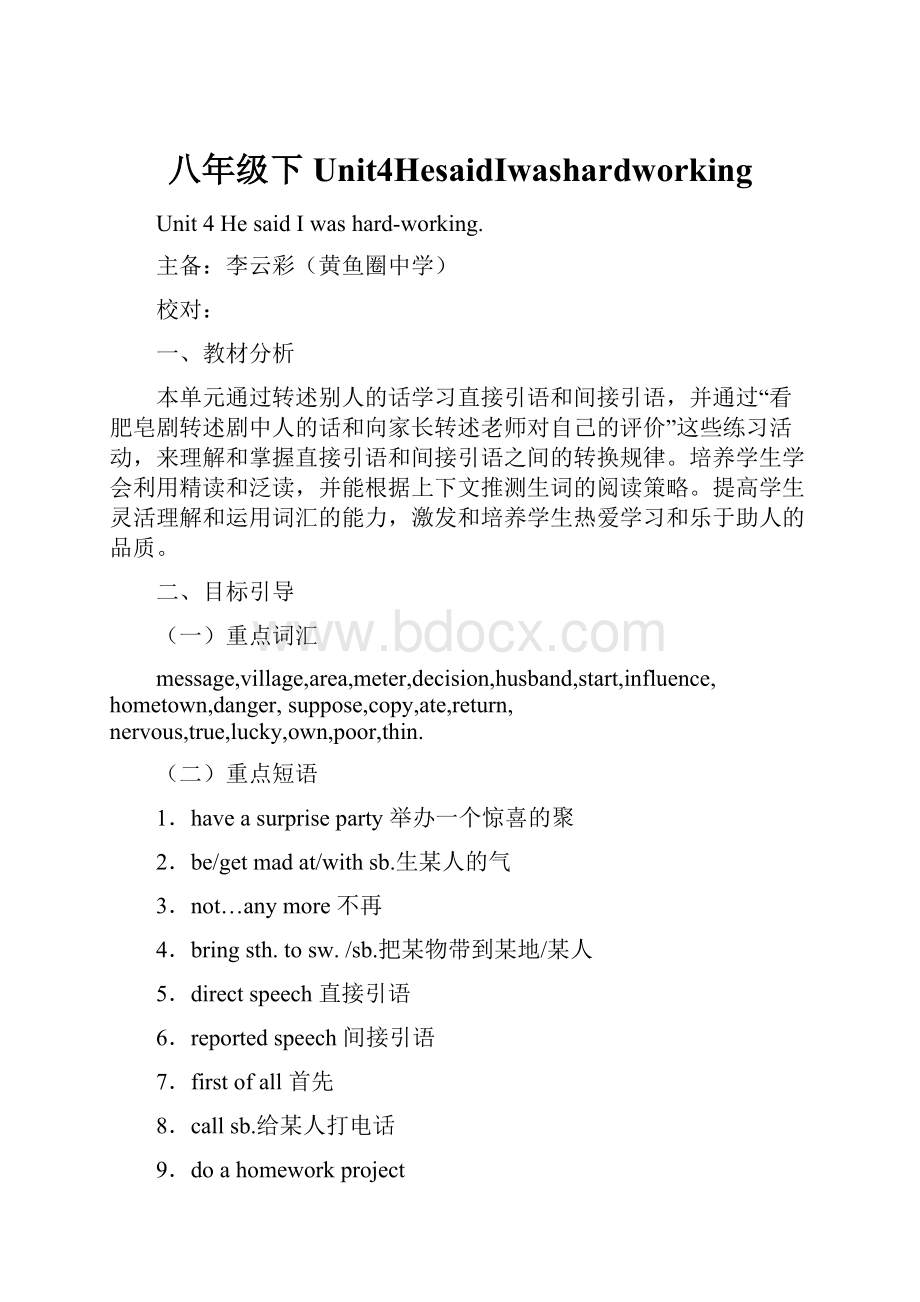八年级下Unit4HesaidIwashardworking.docx
《八年级下Unit4HesaidIwashardworking.docx》由会员分享,可在线阅读,更多相关《八年级下Unit4HesaidIwashardworking.docx(24页珍藏版)》请在冰豆网上搜索。

八年级下Unit4HesaidIwashardworking
Unit4HesaidIwashard-working.
主备:
李云彩(黄鱼圈中学)
校对:
一、教材分析
本单元通过转述别人的话学习直接引语和间接引语,并通过“看肥皂剧转述剧中人的话和向家长转述老师对自己的评价”这些练习活动,来理解和掌握直接引语和间接引语之间的转换规律。
培养学生学会利用精读和泛读,并能根据上下文推测生词的阅读策略。
提高学生灵活理解和运用词汇的能力,激发和培养学生热爱学习和乐于助人的品质。
二、目标引导
(一)重点词汇
message,village,area,meter,decision,husband,start,influence,hometown,danger,suppose,copy,ate,return,nervous,true,lucky,own,poor,thin.
(二)重点短语
1.haveasurpriseparty举办一个惊喜的聚
2.be/getmadat/withsb.生某人的气
3.not…anymore不再
4.bringsth.tosw./sb.把某物带到某地/某人
5.directspeech直接引语
6.reportedspeech间接引语
7.firstofall首先
8.callsb.给某人打电话
9.doahomeworkproject
workonahomeworkproject做家庭作业
10.atone’shousedoingahomeworkproject在……家做作业
11.passsth.tosb.
passsb.sth.把……传递给……
12.passon…传递
passsth.ontosb.把……传递给……
13.besupposedtodosth.被期望或被要求…
14.dobetterin…在……方面做得更好
15.beingoodhealth身体健康
16.finishmyend–of–yearexams结束年终考试
17.reportcard成绩单
18.getnervous变得紧张
19.inthemail在邮件中
20.haveareallyhardtimewithscience自然课学得很吃力
21.besurprisedtodosth.做……感到很吃惊
22.helpsb.do/withsth.帮助某人做某事
23.haveabigfight打了一大架
24.talktosb.跟某人说话
25.haveafight打架
26.startabadhabit养成/开始坏习惯
27.I’msurethat…我确信……
28.getover克服
29.inapoormountainvillage在一个贫穷的山村
30.soundlikefuntosb.对你来说听起来是件趣事
maynotsoundlikefuntosb.或许不是你的兴趣所在
31.onaone–yearprogram在为期一年的援助计划中
32.theMinistryEducation教育部
33.ChineseYoungPioneers中国少年先锋队
34.sealevel海平面
35.agreewithsb.同意……的观点
36.openupone’seyes打开……的眼界/拓展学生的视野
37.makesb.dosth.使得某人做某事
38.carefor照料、照顾
39.doctorswithoutborders没有国界的医生
40.wildanimalsindanger处于危险中的野生动物
(三)重点句型
1.ShesaidshewasmadatMarcia.
2.ShesaidshewashavingasurprisepartyforLanaonFridaynight.
3.Hetoldmehewouldcallmetomorrow.
4.Shesaidshecouldspeakthreelanguages.
5.Itallstartedwhensheaskedmeifshecouldcopymyhomework.
6.Iaskedherwhyshewantedtodothat.
(四)语法:
现在完成进行时
直接引语和间接引语(Directspeechandreportedspeech)
(五)话题
学会转述别人的话
三、重难点解读
1.ShesaidshewashavingasurprisepartyforLanaonFridaynight.
她说她准备在周五的晚上为拉娜举办一个惊喜聚会。
(1)这是一个宾语从句,也是间接引语,主句用过去进行时,从句也要用过去的某种时态。
此句中用过去进行时表示过去将来时。
(2)surprise在第二单元作为动词出现,在此句中是名词作定语,表示“惊讶、惊喜、出乎意料”的含义。
常见的短语toone’ssurprise,insurprise,besurprisedatsth.
2.Lanasaidshewasn’tmadatMarciaanymore.
(1)bemadat/withsb.生某人的气
She’smadatmeforbeinglate.她因我迟到而生气。
(2)bemadabout…因某事生气
We’reallmadaboutthenoise.
(3)mad还有“疯狂的,着迷的”eg:
Youmustbemadtodrivesofast!
你开的这样快,简直疯了。
Theyaremadaboutfootball.他们对足球很着迷。
(4)anymore是副词,常用于否定句和疑问句中,相当于anymore表示(不)再,再也不。
Theydon’tlivehereanymore.
Dotheymakethismodelanymore?
3.Iwillbringsomedrinksandsnackstoyourhouse.
我会带一些饮料和天使到你家。
(1)bring“带来”指带到说话者处eg:
MyfriendBobcametomypartyandbroughtmeapresent.
(2)take带(拿)走,指从说话人处拿走
4.Firstofall,MarciatoldBenshewashavingasurprisepartyforLana.
首先,玛西娅告诉本她打算为拉娜举办惊喜聚会。
(1)firstofall意为“首先”。
eg:
Firstofall,letmetellyouthenews.
(2)近义词组atfirst,atthebeginning起初,起先,开始与后来发生的事相对照。
AtFirst,Ididn’twanttogo,butsoonIchangedmymind.
5.However,Marciacalledeveryone。
然而,玛西娅却给每个人打电话。
(1)however是副词,意为“可是,不过,仍然”可用在句首、句中、和句尾。
使用时必须用逗号隔开。
在意思上于but差不多,但语气较but委婉,两者不可同时使用,however作为副词,不能连接两个分句,而but可作连词,能连接两个分句。
eg:
Myroomissmall.It’sverycomfortable,however.
6.BandCareatB’shousedoingahomeworkproject.
Doingahomeworkproject是动词-ing形式,用来做伴随状语。
eg:
Theysatinfrontoftheirhouselaughingandchatting.
7.Passonthemessage.传一下这个信息。
(1)passon中“on”是副词,表示“继续传递,接着传递”
强调动作发生的连续性,通常传递的动作时在多人之间进行,如果仅是两人之间
的一次性传递,就不必用on。
I’llreadthebookafteryou,andthenIwillpassitontoLucy.
TompassedonthesticktoMike.
8.Cborrowedyourjacketanddidn’treturnit.
(1)return=giveback归还eg:
I’mgoingtothelibrarytoreturnmybook.
(2)return=come/goback回来,返回eg:
MyfatherwenttoChangchunyesterdayandhe’llreturninfivedays.
9.You’resupposedtomeetatthebusstopthismorningtoreturnit.
你本应该今天早晨在汽车站还它。
(1)besupposedtodosth.是一个被动结构,表示按照规则、规律或约定“应该、应当、理应”去做某事,后接动词不定式。
eg:
We’resupposedtocleanourclassroomeveryday.
(2)suppose作“想、认为”解,相当于think,否定从句在主句处否定。
Idon’tsupposeyouareright.
10.Icandobetterinmath.我数学方面学的比较好。
原级是dowellin=begoodat…擅长于……在某方面做得好
11.IhopethatGrandpaiswellnow.我希望爷爷现在身体健康。
(1)well在本句中作形容词,表示“健康的,身体好”
Howareyou?
I’mverywell.Thanks.
(2)well还可作副词,意为“好地”
Runningstareatswell.
12.I’msorrytohearthathehadabadcoldlastweek.
(1)besorrytodosth对……感到难过/抱歉
I’msorrytotellyouthatIcan’tgotoschool.
(2)besorryforsth/doingsth.因……而抱歉/遗憾eg:
Maryissorryforbeinglate.
13.beingoodhealth=behealth=bewell=have/enjoygoodhealth身体健康
14.Ihadareallyhardtimewithsciencethissemester.这学期我学习科学很吃力。
(1)haveahardtime的同意短语有:
havetrouble/difficulty其后常加with短语或(in)+v-ing形式,意为“在某方面有麻烦/困难或有一段很苦的时间。
eg:
JohnhadahardtimespeakingEnglish.
(2)它的相反短语是haveagoodtime/havefun其后也可接相同的形式。
eg:
Theyhadfunhikinginthemountain.
15.Anotherdisappointingresultwasinhistory.
(1)disappointingadj.“令人失望的“通常用来形容一件事或一种情况。
eg:
Theresultofthematchwasdisappointing.
(2)disappointing是由动词disappoint加后缀–ing变来的,其后还可加后缀–ed变成形容词,用来形容人。
bedisappointedat/aboutsth.对某事失望eg:
MyEnglishteacherisdisappointedatmywriting.
(3)我们学习的很多动词都可以变成常有的形容词,它的现在分词形式常指一件事或一种情况;它的过去分词形式常指人。
eg:
excite–exciting–excitedinterest–interesting–interested
surprise–surprising–surprisedbore–boring–boredetc.
16.Iaskedherwhyshewantedtodothatandshesaidthatshehadforgottentodohers.我问她为什么她想那样做,她说她忘了做她自己的作业了。
(1)whyshewantedtodothat是一个从句,作asked的宾语。
在宾语从句中,从句必须用陈述语序。
(2)shehadforgottentodohers也是一个宾语从句。
hadforgotten是过去完成时,表示动作发生在shesaid这一动作前。
即“过去的过去”。
还因为它是受主句是“一般过去时”的影响。
(3)forgettodosth.意为“忘记要做某事(尚未做)”,forgetdoingsth.。
意为“忘记做过某事(已做过)”。
17.Isaiditwouldstartabadhabit.我说那会养成坏习惯。
(1)wouldstart构成过去将来时,这是受主句谓语动词said的影响,否则应该用一般将来时。
(2)habitn.常与of+v–ing连用,意为“……的习惯”。
eg:
ShehasagoodhabitoflearningEnglish.
18.getover克服/战胜(困难、情绪)。
eg:
Whenyouanswertheteacher’squestions,youmustgetoveryournervousness.
19.ownadj.&pron.自己的eg:
Sheshoulddoherownhomework.(adj.)
Thecomputerisherown.(pron.)
own还可作动词用,意为“拥有”eg:
Iwanttoownanewcomputer.
它后可加后缀–er变成名词–owner(拥有者)
20.changev.改变,变更,变换eg:
Shechangedhermind.
n.变化,改变eg:
Greatchangestookplaceinmyvillagelastyear.
21.poor.adj.
(1)贫穷的,贫困的。
eg:
Myfamilyusedtobepoor.
反义词为rich.
(2)质量差的,可怜的。
eg:
Paulisinverypoorhealth.MyEnglishispoor.
(3)thepoor意为“穷人,贫民”
22.graduate
(1)n.(大学)毕业生eg:
SheisagraduateofLondonUniversity.
Johnisahigh-schoolgraduate.
(2)v.毕业,取得……学位eg:
HersistergraduatedinHistoryfromCambridgeUniversity.
23.…,andatfirstthethinairmadeherfeelsick.
(1)thinadj.比较级thinner,最高级thinnest,稀薄的,稀疏的,薄的,反义词为thick。
eg:
athinbook,athinsauce瘦的,反义词为fat/heavyeg:
Youneedtoeatmore.You’retoothin!
(2)makesb.dosth.使得某人做某事,make后接省略“to”的不定式即动词原形作宾语补足语。
24.aboveprep.在……的上方,表示不接触物体表面,常与表示温度、海拔、价格的词等连用,意为“超过……”。
eg:
Isawthemoonabovethebuilding.(在……上)
Thepriceoftheticketisabove100yuan.(超过)
25.decisionn.决定,决心
(1)makeadecision
(2)decide.v.决定eg:
TheydecidedtotraveltoAustralia.
26.carefor
(1)照料,照顾相当于lookafter/takecareofcaren.照顾,照料eg:
Allthechildrenintheircarewerehealthyandhappy.
v.关心,介意eg:
Idon’tcarewhatyoudo.
(2)喜欢,需求eg:
Idon’tcareforbaseball.
27.Dangern.危险,反义词为safety,indanger处于危险中outofdanger脱离危险
dangerousadj.危险的,反义词为safeeg:
It’sdangeroustoswimaloneintheriver.
【语法归纳】
直接引语和间接引语
引述别人的话,一般采用两种方式:
一是直接引用别人的原话,把它放在引号内,叫做直接引语;二是用自己的话转述别人的话,被转述的话不放在引号内,叫做间接引语。
间接引语一般构成宾语从句。
1.直接引语改为间接引语时,都要使用陈述语序,但是因为原句的句式不同,变成间接引语时所用的连词要调整。
【1】直接引语时陈述句,变成间接引语时由连词that引导,that也可省略。
Shesays,“Ilikebeingwithyou.”Shesays(that)shelikesbeingwithus.
【2】直接引语是一般疑问句,变成间接引语时由连词if或whether引导。
(if可与ornot连用,whether不能)
Heaskedme,“Doyougotoschoolbybike?
”
Heaskedmeif/whetherIwenttoschoolbybike.
【3】直接引语是特殊疑问句,变成间接引语时由相应的疑问词引导,eg:
who,whom,what,whose,how,when,why,where等。
Mymotheraskedme,“Whendoyoucomehome?
”
MymotheraskedmewhenIcamehome.
【4】直接引语是祈使句,变成间接引语时把动词原形变成动词不定式,并在动词不定式前面加tell,ask,order的宾语。
“Listentomecarefully.”theteachersaid.
Theteachertoldustolistentoher/him
Mysisteraskedme,“Don’tplaythemusictooloud.”
Mysisteraskedmenottoplaythemusictooloud.
【注】若是祈使句的否定式,变间接引语时在动词不定式前加not..
2.直接引语改为间接引语时,除将引语部分变成宾语从句外,还要对直接引语中的人称、时态、指示代词、时间状语、地点状语等进行适当的变化。
【1】时态的变化:
如果主句谓语动词是一般现在时或一般将来时,从句时态无需变化;如果主句谓语动词是一般过去时,直接引语变间接引语时,从句的谓语动词在时态上要做相应的变化。
Myfatheroftensays,“Youdoyourhomeworkaftersupper.”
Myfatheroftensaysthatyoudoyourhomeworkaftersupper.
Shesaid,“Thebooksonthetablearemine.”
Shesaidthatthebooksonthetablewerehers.
WangMingsaid,“I’lldoitinaminute.”
WangMingsaidthathewoulddoitinaminute.
(1)一般现在时——>一般过去时
(2)现在进行时——>过去进行时
(3)一般将来时——>过去将来时
(4)现在完成时——>过去完成时(这个时态还没有学习,现在可以不做介绍)
【注】直接引语是客观事实、真理,变成间接引语时,时态不变。
Theteachersaid,“Lighttravelsfasterthansound.”
Theteachersaidthatlighttravelsfasterthansound.
【2】人称代词、指示代词、时间状语、地点状语也需进行相应变化。
直接引语
间接引语
指示代词
this
these
that
those
时间状语
now
today
yesterday
lastweek
tomorrow
nextyear
afewyearsago
then
thatday
thedaybefore
theweekbefore
thenextday
thenextyear
afewdaysbefore
地点状语
here
there
四、中考展示
单项选择
()1.----DidMrsKingleaveamessage?
(2009江苏南京)
----Yes.Shewantedtoknow______thisSunday.
A.whoyouwouldgoshoppingB.ifyouwouldgoshoppingwithher
C.thatyouwillgoshoppingD.whenwillyougoshoppingwithher
()2.Wearegoingforapicnictomorrow.IwillcallWendytomakesure_____.
(2008河北)